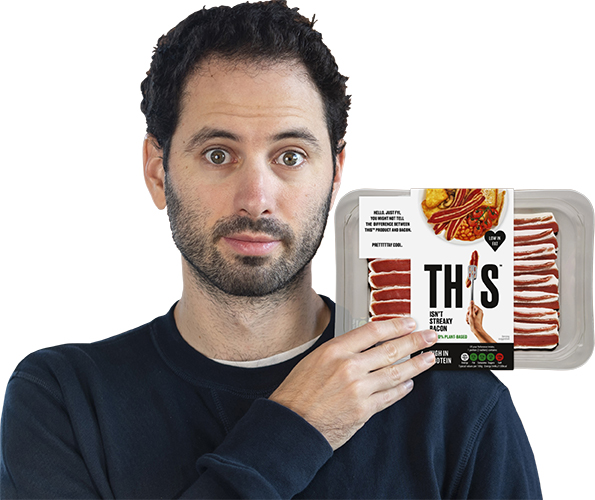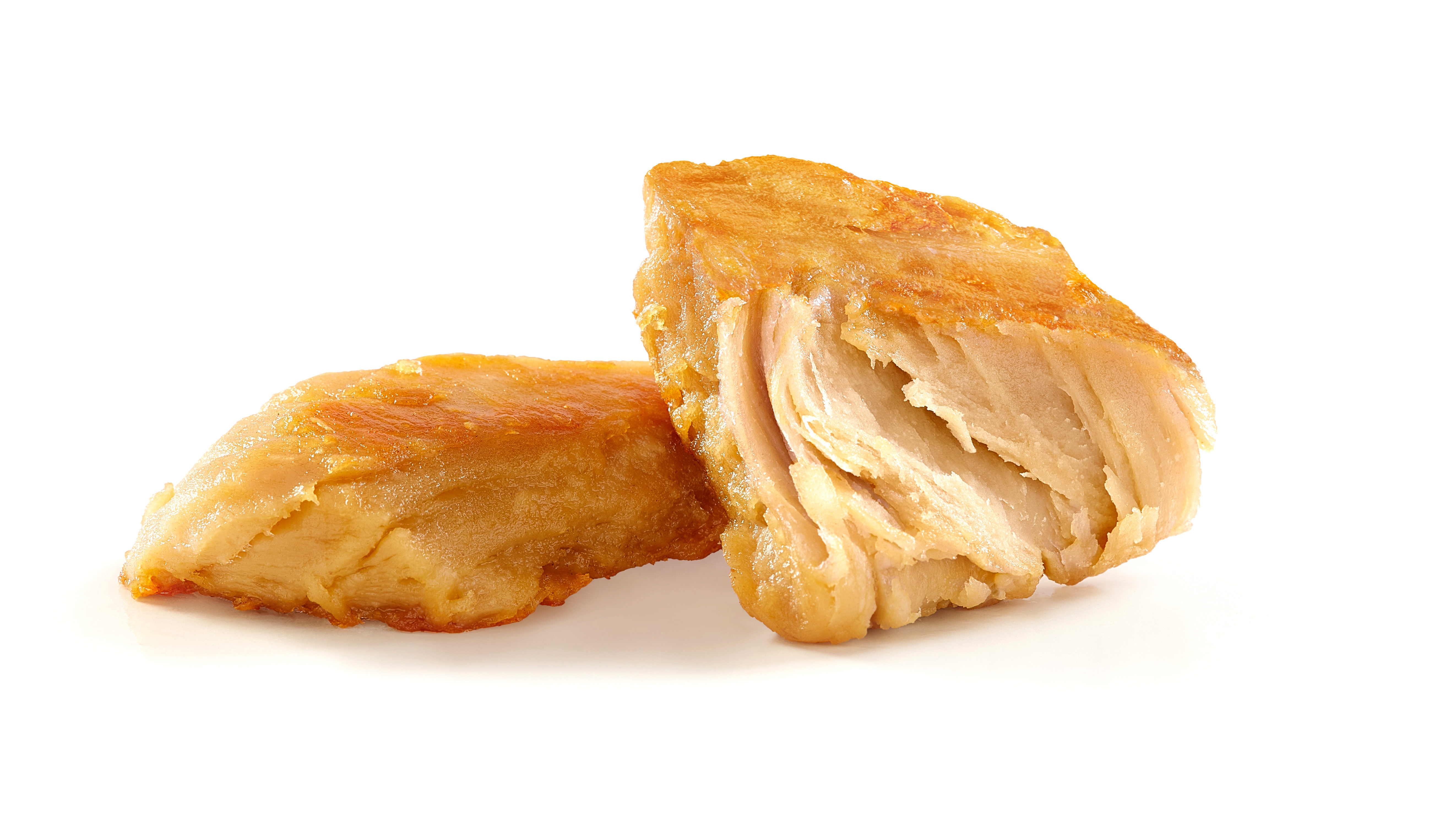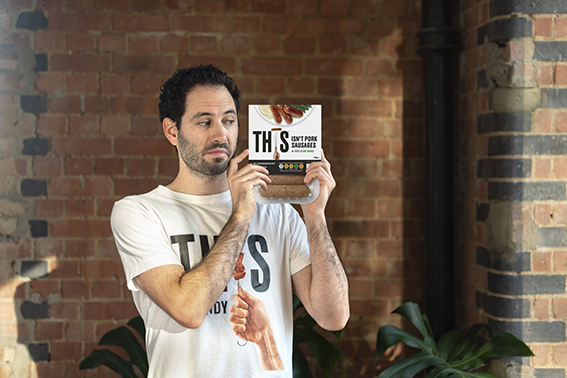

Protein Pioneer: Andy Shovel
Andy Shovel and his team at THIS have not pioneered the plant-based sector, but they’re certainly revolutionizing it. Innovations in R&D, a unique approach to marketing, a loyal and growing customer base, and – above all else – a fantastic range of products are seeing the company buck the trend. Nick Bradley discovers some of the secrets behind the company’s success
Regardless of whether you’re vegan, vegetarian, flexitarian or a good old-fashioned meat-eater, if you’re a Brit, the chances are you’ve probably heard of ‘THIS’. You may have seen its products on the shelves in UK supermarkets, or perhaps even clocked one of its witty advertising campaigns in the print media, on billboards, London buses, social media, television, or even read about one of its infamous PR stunts.

The UK plant-based food company stands out among the crowd, not just because of its striking branding, its propensity to poke fun at the naysayers and tongue-in-cheek messaging, but also because, most importantly, it makes great-tasting, authentic multi-award-winning products.
The brand’s growing range includes plant-based versions of beef, pork, chicken and lamb across both chilled and frozen meat-free aisles, as well as food-to-go with plant-based sandwiches, wraps and salads. Aside from the selection, THIS is achieving what many brands in the plant-based sector aren’t with with sales and revenue on an upward trajectory. This food-tech is a massive success story.
Man on a mission
A great deal of that is down to Andy Shovel, Co-CEO & Founder, although he’s quick to say he doesn’t take credit for the company’s intriguing brand name. “That goes to my ex-girlfriend,” he reveals, “who, in the midst of a one-hour brainstorm, uttered 15 words. One of those resonated profoundly with me, and became the cornerstone of our direction. “I should clarify that we are no longer together,” Shovel says of his ex, with a wry smile, “eliminating any concerns about potential claims had we taken the path of marriage and eventual divorce!”
Joking aside, it was paramount to Shovel and his business partner, Pete Sharman (also Co-CEO & Founder), that the name for the brand encapsulated brevity, impact, distinctiveness, as well as a focus on the products.
“’THIS’ ticked all the boxes,” he says. “I find its short, punchy nature intriguing, particularly as it has the tendency to puzzle people, adding a touch of amusement. That element of confusion becomes a source of enjoyment, especially when deciding on dinner plans.”
Inspired choices
When asked what inspired him to launch into the plant-based sphere in the first place, though, Shovel says the answer to that question has evolved over time. Prior to launching THIS, Shovel and Sharman ran a company called Chosen Bun. “Essentially we sold meat and chicken – it was a burger, takeaway and restaurant business,” he says, accepting it’s not the conventional route into the plant-based food sphere.
However, in 2016, the duo decided to divest from the carnivorous realm and immerse themselves in the world of sustainability – and in the world of food, that can only
mean plant. “Given the quality of products at the time, we knew we could really lean into the product development and technology and felt there was a great opportunity in the UK category to do some disruptive NPD and branding, which we believed we could execute in a really exciting way,” Shovel recalls. “I guess in those earlier days, my motivation was rooted in pragmatic rather than romantic reasons.

“Pete shared my enthusiasm, and was especially fueled by the developments happening in the USA with companies such as Beyond Meat and Impossible Foods. At that time, the innovation in the plant-based world was especially exciting.”
Neither Sharman nor Shovel were vegan in 2019 when they unveiled THIS, but as their entrepreneurial journeys unfolded, Shovel did become a vegetarian before eventually transitioning to a fully plant-based lifestyle a few years ago.
Fast-forward to the present, and Shovel says he finds himself completely “mission-driven”, which he freely admits is in “stark contrast” to his mindset in the earlier stages of the venture. And while sustainability was – and always has been – a driving force, he points out he’s a “very passionate animal lover” who “believes strongly” in improving animal rights.
Cash injections
So, all of the right reasons for getting into the space, then, but how on earth has the company become such a success? And where did they get all the backing to do it? For Shovel and Sharman, it started with self-funding, and subsequently involved securing investments from individual angels, VC funds, crowdfunding, and even a corporate backer.
An initial crowd raise in 2020 secured more than £4 million (US$5 million), plus there was £8.7 million (US$11 million) of seed funding. In 2021, a further £11 million (US$13.9 million) was raised from a Series A. And in 2023, THIS closed a Series B of £15 million (US$19 million), which included more than £10 million (US$12.6 million) from institutional investors, including BGF, Lever VC, Backed, Five Seasons Ventures, ECG Research, CJ Corporation, and Kreos Capital. A whopping £4.7 million (US$5.9 million) of that was raised via crowdfunding on the Seedrs platform.
“We’re going to get off the funding merry-go-round now so moving forward, it’s a case of aiming to get profitable by the end of this year,” Shovel reveals.
For startups venturing into the sector, his advice would be to prioritize a deep understanding of their unique genomics and ensure a strong, positive gross margin right from the start. “Gone are the days when you could simply burn through cash and focus solely on growth, relying on your venture capitalists to foot the bill,” he says. “In today’s landscape, financial prudence is crucial.”
Especially in the plant-based space, we’ve seen companies who I think do science for the sake of getting VC investment
With investors seemingly more cautious over the past 18 months, they’re keener than ever before to back winners. THIS certainly fits the criteria. In the face of a 5% decline in the overall category last year, and it has to be said against the odds, the company experienced a remarkable 45% surge in sales, firmly establishing itself as the UK’s fastest-growing plant-based brand for 2023.
Reflecting on last year as whole, Shovel says the standout moments were marked by a series of successful product launches, among which there was one, in particular, that initially instilled trepidation within the management team – its ‘THIS Isn’t Roast Chicken & Stuffing’ product, launched in time for Christmas 2023.
“I was absolutely terrified,” Shovel says of the double chicken breast with a savory stuffing and a topping of garlic-infused plant-based butter, which carried a price point close to £6. “We all thought, ‘Oh my god, nobody’s gonna buy this; the product’s great but it’s too expensive. But when it launched, it just flew. During the Christmas weeks, it achieved a rate of sale of about 20 across retailers, positioning it among the highest-performing products in the entire category.”
Another highlight was the continuing march of its plant-based sausages (‘THIS Isn’t Pork’ and ‘THIS Isn’t Pork Caramelised Onion’), introduced fewer than two years ago. “They’re currently number two, closely trailing Richmond, but we’re making strides toward claiming the top spot,” Shovel enthuses. “Witnessing this growth has been immensely satisfying, not only for the obvious success it represents but also because, internally, we just didn’t want to be seen as the ‘bacon guys’.”
Opinions of difference
Obviously, taste and texture are key in the success of any plant-based food brand, influencing consumer acceptance, satisfaction, and the overall culinary experience. Clearly, THIS is doing something right on both counts.

“Our differentiation in taste, texture, and variety stems from a robust and sizable innovation function within our business,” says Shovel. “We’ve assembled a team of approximately 20 food scientists who focus exclusively on the science of food innovation. Additionally, we’ve made significant investments in our own pilot- and large-scale high-moisture extrusion machines, which is quite unusual for a brand. This allows us to iterate and push the boundaries when it comes to extrusion technology.
“Within our innovation team, there’s also a specialized subsection dedicated to future-focused science, looking one to three years ahead,” Shovel continues. “This strategic approach has started yielding benefits, particularly in areas such as fat systems where we consider ourselves at the forefront globally.
“In our sausages, for example, we’ve developed a clever fat system that achieves a remarkably low fat content (5% saturated fat), which is even lower than traditional pork sausages, while maintaining a succulent and juicy texture,” Shovel says. “Our approach involves leveraging trapped water in our fat system and employing other techniques to create a product that not only aligns with health considerations but also provides a satisfying taste and texture experience.
“Especially in the plant-based space, we’ve seen companies who I think do science for the sake of getting VC investment,” Shovel feels. “I won’t name names, but I think that’s been common – vanity projects to raise millions. We’ve tried hard to do science for consumers and to achieve that [all-important] taste and texture.”
As for ingredient profiles, Shovel explains they vary across different products, but there are some key components that are featured prominently. “Pea protein is a significant source of protein in many of our products, along with soy,” he says. “We also use olive oil as a fat source for various fat systems in different products. These ingredients, along with a mix of others, contribute to their unique profiles.”
THIS places a great deal of emphasis on the number of ingredients in its products. “While the specific ingredients may vary, we strive to ensure that our labels remain as clean as possible within our subcategory. This means minimizing the use of additives and unnecessary ingredients, aligning with the current trend toward cleaner and more transparent labeling in the plant-based food sector.”
In the eyes of more hardline vegans, sometimes we’re not vegan enough
Flying high with wings
Certainly, navigating the challenges and breakthroughs in R&D has been a dynamic journey for Shovel, Sharman and their team, with some exemplary examples.
“One recent breakthrough is the launch of our plant-based wings in the restaurant sector,” Shovel reveals, referring to the recent ‘THIS Isn’t Chicken Wings’ Veganuary collaboration with BrewDog (food-service represents about 25-30% of the business).

“About two years ago, the team had a creative session where they set aside their usual work and explored new ideas,” recalls Shovel. “During this ‘playdate’, a scientist discovered a method of putting the plant-based meat together [soy and pea protein are shaped into bundles of muscle fibers, inter-dispersing an olive oil-based fat], leading to the creation of this exceptional product. The [seaweed-based] skin encapsulates the entire structure, providing a realistic, crisping texture while maintaining succulence. This has been a significant achievement in R&D, and we anticipate introducing more products using the same technology. These wings stand out for their skin-like appearance and a texture reminiscent of a traditional chicken wing – succulent, tender, and full of flavor.”
However, Shovel goes on to add, with innovation comes challenges. “One such instance involves our streaky bacon, a product with high potential,” he says. “Although it’s performing well and is expected to be the best-selling plant-based bacon for a long time, we did face teething problems during the launch.
“The unique approach of creating plant-based muscle bonded to fat to emulate streaky bacon presented challenges in maintaining the structural integrity of the product. Initially, when launched in January last year, the bonding was not consistent, leading to issues with the product coming apart in the packaging. Although we have largely addressed and fixed this issue, there’s now the task of rebuilding trust and encouraging people to give the product another try.”
The tough love of the plant-based market
Such teething problems aside, THIS is flying high in a UK plant-based sector that has seen some companies shut their doors entirely in 2023. In May, sausage maker Heck cut its range of meat-free products from 10 to two, food-service retailer Pret a Manger closed 50% of its vegetarian- and vegan-only outlets, and Nestlé, in the UK at least, canned its Garden Gourmet vegan brand. A month or so later, Vegan Food Group (formerly VFC) acquired Meatless Farm. And in August, Beyond Meat announced its sales had fallen by almost a third over the previous three months. And LoveSeitan, which supplied plant-based products to the likes of Tesco, Sainsbury’s and Aldi, collapsed entirely. Ironically, in December, Vbites (hailed as a savior when it rescued Plant & Bean in July), also went into administration.
So, what on earth does Shovel believe is going on? “I think what we’re witnessing in the current market dynamics, especially in the UK in 2023, appears to follow a somewhat conventional pattern that has been observed in various industries,” he explains. “The process typically involves an initial stage of over-proliferation, fueled by hype and widespread interest – people thinking, ‘Oh, I gotta get a piece of that’. It’s not unique to the plant-based sector – we’ve seen it craft beer, popcorn, coconut
water, and smoothies in the past.

“But,” Shovel wonders, “in the plant-based industry, perhaps the press and public reaction might be more emotional and excitable due to the underlying politics and societal significance associated with plant-based lifestyles.”
Over time, though, he says markets do tend to stabilize, and resilient brands that offer unique value and adapt to changing consumer preferences stand a better chance of thriving in the long term.
Shovel does, however, agree to the presence of what on the face of it seems to be a strong ‘anti-vegan sentiment’ in certain segments of the press, particularly the right-wing press. “This could be influenced by the demographics and political perspectives of the individuals writing the articles,” he suspects. “The Telegraph, in particular, has been noted for its critical stance on plant-based topics, often publishing what may be perceived as ‘hit pieces’ on the subject.”
In short, then, what we saw in 2023 for plant-based, its annus horribilus, is more than likely the correction and consolidation that we have witnessed in other sectors. Certainly it’s not something that keeps Shovel awake at night. “I think we’re probably halfway through that stage so there will be more to come,” he predicts.
“In actual fact, consolidation can be positive as it streamlines the market, providing consumers with high-quality products and reducing confusion when shopping.”
For brands that may face challenges or exit the category, perhaps it’s just the natural outcome of free market economics. In essence, it reflects a form of “tough love”, notes Shovel, where products or brands that do not align with consumer needs or fail to deliver in terms of quality may find it difficult to thrive. And that underscores the importance of continuous improvement and responsiveness to consumer feedback to thrive in a dynamic and evolving industry.
Marketing genius
No interview with THIS – and Shovel especially – can leave out the topic of marketing. Based on some its PR stunts, including holding a state funeral through the streets of London for bacon when its ‘THIS Isn’t Streaky Bacon’ launched, it may appear that the company doesn’t take itself too seriously, but of course this is not entirely the case.
“It may come across as a bit silly and chaotic, but it’s all a very deliberate attempt to recognize that people often have negative misconceptions about plant-based meat alternatives, and veganism in general,” Shovel says. “So, I think what we try to do with our branding and marketing is disarm people’s defences and preconceptions, by entertaining, surprising and sometimes shocking the consumer. Sometimes I think of us as a media company that happens to sell food. We’ve tried to be refreshing and a different voice in the category. Every function in the business, whether finance or ops, plays a part, of course, but if I were to oversimplify it, I’d say our success is possibly 50% brand and 50% product.”
THIS certainly grabs your attention. Who could forget ‘Mincent Van Gogh’? In November 2022, Shovel and his team created their own take on the Dutch master’s Sunflowers painting, with the same yellow and orange flowers but with a packet of ‘THIS Isn’t Beef Mince’ depicted. It was hanging in Amsterdam’s Van Gogh Museum for an hour before anyone noticed! Meanwhile, in 2020, and to celebrate its launch into supermarket chain Waitrose, the company hired an Ed Sheeran lookalike to hand out vegan nuggets in London. And in December 2021, THIS even fooled an entire Italian food show that it was an artisan meat business.
“We tend to record our stunts and put them online, and sometimes they get picked up by the press,” says Shovel, of the pranks. “It makes me happy when people hold us up as a beacon of silliness in the FMCG market – and I often have people asking me in March what we have planned for April Fool’s Day. I think it’s what’s helped us get a really high brand score (NPS), which is currently 87%.”

Most recently, THIS also made it to the big screen, with a television advert featuring Grace Dent, which saw the food critic taking part in a sausage taste test. In the 30-second promo, she bites into what she is told is a traditional pork sausage, only to find out it was plant-based. The advert concludes with a voice note from Dent’s agent raising concerns about her credibility as a food critic. “I’m an extra playing the sound guy in that advert,” Shovel confirms.
Appealing to the masses
Where THIS appears to have succeeded and some others have failed is appealing to all consumers. “In the eyes of more hardline vegans, sometimes we’re not vegan enough,” Shovel says, when discussing how he navigates the marketing challenges with product positioning. “And sometimes we’ve had negative feedback from the vegan community, but at the same time you’ve got to be careful to not be too vegan for the mainstream. It’s a tightrope. If you’re really pushing the envelope, sometimes you’re going to get it wrong.”
What’s clear is that in an exceptionally fast-moving and continually evolving industry, such as plant, instead of merely following trends, you have to push that envelope and stay ahead of trends. THIS has managed to achieve this with aplomb since its launch, introducing products that stand out and defy conventional expectations.
“I’m a big believer in the Henry Ford quote, which if I get it right suggests that if he had asked people what they wanted, they would have requested a faster horse. Consumers don’t always know what the next trend is that they will be excited by. And it takes an innovator or an innovative company to create that.”
If you have any questions or would like to get in touch with us, please email info@futureofproteinproduction.com
More Features

Feeding change

Protein Pioneer: Kesha Stickland








